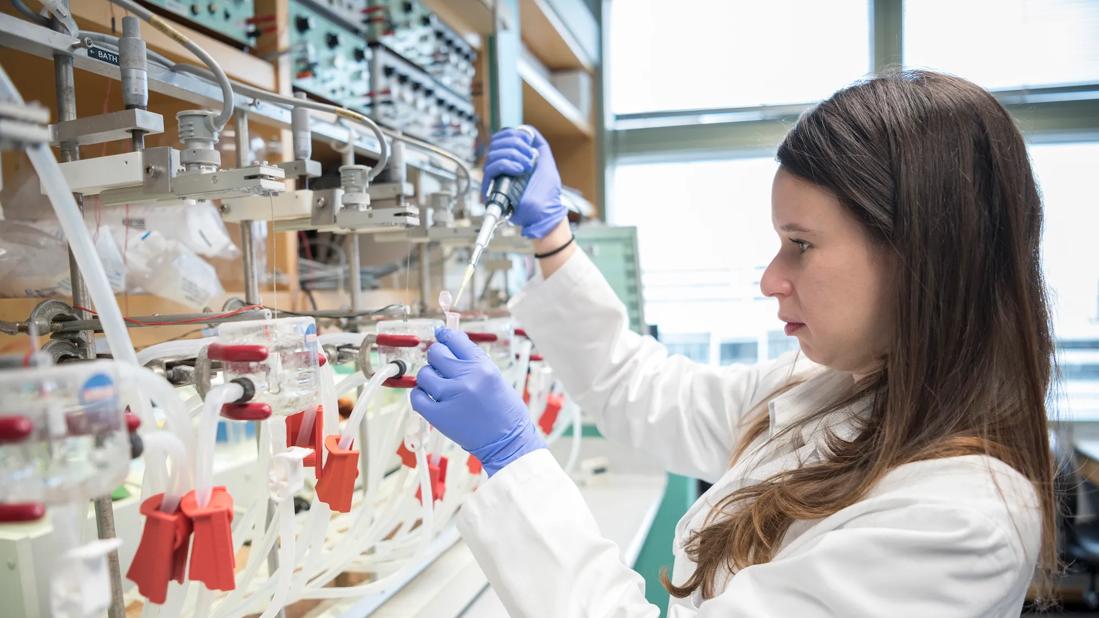New positions and heavy investments reinforce the commitment

Image content: This image is available to view online.
View image online (https://assets.clevelandclinic.org/transform/1d649dbb-cade-4c92-b76c-1aeb76d2fd7b/LRI-1781266_12-05-19_224_RN-jpg)
Researcher in lab
Since being named the new Chair of the Head & Neck Institute at Cleveland Clinic, one of the first priorities for Patrick Byrne, MD, is a renewed commitment towards translational research. This aligns with the Institutional commitment towards cancer research, made evident when Cleveland Clinic recruited Timothy Chan, MD, a renowned immuno-oncology and cancer genetics researcher to lead the new Center for Immunotherapy and Precision Immuno-Oncology (CITI). Cleveland Clinic’s Head and Neck Institute has created a new position to direct its research initiatives in cancer and collaborate with Dr. Chan.
Advertisement
Cleveland Clinic is a non-profit academic medical center. Advertising on our site helps support our mission. We do not endorse non-Cleveland Clinic products or services. Policy
“Translational research is one of those terms that has a very broad definition,” says Dr. Chan. “One focus is on learning from patients about who responds and who doesn’t in a trial and using those findings to design your next trials. Translational medicine is a catch-all term that incorporates bench-to-bedside learning and advancement capability.”
Cleveland Clinic has invested significantly to fund CITI. “Coming here was an opportunity to work from the ground up and establish something in a new enterprise for drug discovery and immunotherapy research,” says Dr. Chan.
The Center provides the organization with resources and a strategy to develop immunotherapy for cancer and other diseases, including infectious diseases. There are three components to CITI: a therapeutic component, a research component and a resource component. “The therapeutic component is a program that is aimed towards developing new types of cell-based therapies—like Car T- cells and engineered immune cells—that have started to revolutionize how cancers are treated,” explains Dr. Chan.
Dr. Chan points to several other examples of initiatives that are now being built at the Cleveland Clinic. The Human Immuno-Monitoring Facility is a state-of-the-art resource that allows translational and correlative research to be done by investigators at the Cleveland Clinic. The Precision Oncology Initiative, which involves head and neck tumors is another important flagship project to advance research and clinical care in these tumors.
Advertisement
Subsequent to Dr. Chan’s recent hiring, the Head & Neck Institute is now in the midst of recruiting for another newly created position—Director of Head and Neck Cancer Research.
“Cleveland Clinic invested an enormous amount into bringing a top immune-oncology investigator here,” says Dr. Byrne. “We’re going to mirror that commitment in the Head & Neck Institute by recruiting a physician-scientist and developing a program that can synergize with his efforts.”
The hope is that this position will be filled by a physician-scientist. “We’re hoping that the person we recruit can work collaboratively with the Immuno-Oncology Center,” says Brian Burkey, MD, MEd, Vice Chairman, Head & Neck Institute; Section Head, Head and Neck Surgery and Oncology and Clinical Assistant Professor of Otolaryngology-Head & Neck Surgery. “Dr. Chan has a strong lab system built up to support this. Our hope is to facilitate our physician-scientist to work collaboratively with Dr. Chan’s lab. The culture at Cleveland Clinic is highly collaborative.”
The Director of Head & Neck Cancer Research will direct several exciting research projects, including research specific to the Head & Neck Institute as well as multidisciplinary research. “We have research going on within our institute, but we are also collaborating with other Cleveland Clinic institutes,” says Jamie Ku, MD, head and neck surgeon in the Sections of Head and Neck Surgery and Oncology and Facial Plastics and Reconstructive Surgery and Assistant Professor of Otolaryngology-Head & Neck Surgery at Cleveland Clinic Lerner College of Medicine. “We have a great relationship with Cleveland Clinic Taussig Cancer Institute, so there’s a lot of ongoing things already in place, such as clinical trials and both retrospective and prospective studies.
Advertisement
Additional projects are focused on:
“At the end of the day, our focus is on how we can cure our patients of their cancer and how we can do it more effectively and more efficiently while preserving their quality of life,” says Dr. Ku. “Innovation and research drive all of that. The fact that our enterprise leadership has put a lot of investment and emphasis on that I think is huge, and it tells a lot about where our focus is.”
Advertisement
Advertisement
Analysis of HNSCC patients shows HPV status to be predictive of higher abundance of oncobacteria within the tumor
Case study illustrates the potential of a dual-subspecialist approach
Evidence-based recommendations for balancing cancer control with quality of life
Study shows no negative impact for individuals with better contralateral ear performance
HNS device offers new solution for those struggling with CPAP
Patient with cerebral palsy undergoes life-saving tumor resection
Specialists are increasingly relying on otolaryngologists for evaluation and treatment of the complex condition
Detailed surgical process uncovers extensive middle ear damage causing severe pain and pressure.